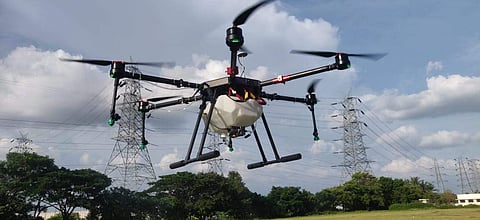

Besides doctors and nurses, the other people who are fighting against COVID-19 at the frontline are sanitation workers. With every inch in the city needing to be disinfected every other minute, these workers are putting their life on the line to ensure the rest of us remain safe. But soon, the workers will have some help with their work and could prevent them from risking their lives everyday. Who is this help? - About 300 drones.
The Garuda Aerospace and student engineers from Agni College of Technology have come with an innovative strategy to utilise their drone technology to combat the spread of COVID-19. The team approached the Tamil Nadu government's Health Department two days ago with the suggestion and the team demonstrated the working of the drone the next day. It has now been approved by the government and are all set to deploy 300 drones that will spray disinfectant across Tamil Nadu.
The team making a demo for the health department officials -
The drones will spray the disinfectant in public spaces like hospitals, metro stations and roads across the state. the drones can carry upto 15 litres of disinfectant and cover about 20 kilometres a day. "A human being can cover about 4-5 kilometres a day whereas a drone can cover 20 kilometres. Which in turn means that with 300 drones, 6000 kms of area can be disinfected in a day," Agnishwar J, the found of Garuda Aerospace and the Vice Chairman of the College said.
Garuda Aerospace, an ISO 9001 certified firm has previously serviced drones to various government departments like forest, miming agriculture, electricity, coast guard and the police for surveillance and crown monitoring operations. "The drones are meant to substitute human health workers in sanitation activities to ensure they don't get affected by the virus. Everyday starting from 6am to 6 pm, a drone works 12 hours. This would also mean that it might be more effective," he explained.
Agnishwar also said that using a drone would be beneficial to spray tall buildings as well that would not be accessible to humans otherwise. "The drone can fly upto 150 metres," he asses. About 500 pilots will be manning the 300 drones, "Drones are capable of covering a distance of 6000 km linear and each drone has the capacity to spray 40 litres of disinfectant every day which means 12000 litres to keep government departments, public places and hot zones (areas defined by WHO as high-risk) where spread happens relatively clean.
